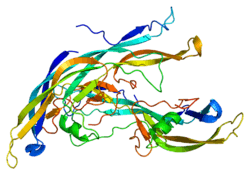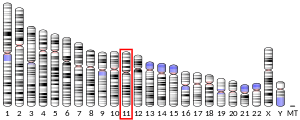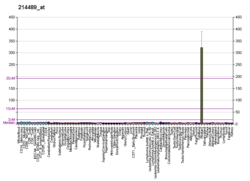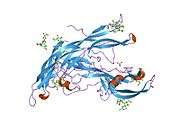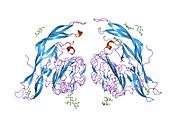FSHB
Follitropin subunit beta also known as follicle-stimulating hormone beta subunit (FSH-B) is a protein that in humans is encoded by the FSHB gene.[5][6][7] Alternative splicing results in two transcript variants encoding the same protein.
Function
The pituitary glycoprotein hormone family includes follicle-stimulating hormone, luteinizing hormone, chorionic gonadotropin, and thyroid-stimulating hormone. All of these glycoproteins consist of an identical alpha subunit and a hormone-specific beta subunit. This gene encodes the beta subunit of follicle-stimulating hormone. In conjunction with luteinizing hormone, follicle-stimulating hormone induces egg and sperm production.[7]
gollark: Implement a zero christian policy.
gollark: That seems unethical.
gollark: Do you have a proposed solution for that? It's a problematic problem.
gollark: S U P P L Y S I D E P O L I C Y
gollark: Nonsense. It sounds very fun.
References
- GRCh38: Ensembl release 89: ENSG00000131808 - Ensembl, May 2017
- GRCm38: Ensembl release 89: ENSMUSG00000027120 - Ensembl, May 2017
- "Human PubMed Reference:". National Center for Biotechnology Information, U.S. National Library of Medicine.
- "Mouse PubMed Reference:". National Center for Biotechnology Information, U.S. National Library of Medicine.
- Watkins PC, Eddy R, Beck AK, Vellucci V, Leverone B, Tanzi RE, Gusella JF, Shows TB (Aug 1987). "DNA sequence and regional assignment of the human follicle-stimulating hormone beta-subunit gene to the short arm of human chromosome 11". DNA. 6 (3): 205–12. doi:10.1089/dna.1987.6.205. PMID 2885163.
- Shome B, Parlow AF, Liu WK, Nahm HS, Wen T, Ward DN (Sep 1989). "A reevaluation of the amino acid sequence of human follitropin beta-subunit". J Protein Chem. 7 (4): 325–39. doi:10.1007/BF01024882. PMID 3151250.
- "Entrez Gene: FSHB follicle stimulating hormone, beta polypeptide".
Further reading
- Barrios-De-Tomasi J, Timossi C, Merchant H, et al. (2002). "Assessment of the in vitro and in vivo biological activities of the human follicle-stimulating isohormones". Mol. Cell. Endocrinol. 186 (2): 189–98. doi:10.1016/S0303-7207(01)00657-8. PMID 11900895.
- Saxena BB, Rathnam P (1976). "Amino acid sequence of the beta subunit of follicle-stimulating hormone from human pituitary glands". J. Biol. Chem. 251 (4): 993–1005. PMID 1249074.
- Keene JL, Matzuk MM, Otani T, et al. (1989). "Expression of biologically active human follitropin in Chinese hamster ovary cells". J. Biol. Chem. 264 (9): 4769–75. PMID 2494176.
- Jameson JL, Becker CB, Lindell CM, Habener JF (1988). "Human follicle-stimulating hormone beta-subunit gene encodes multiple messenger ribonucleic acids". Mol. Endocrinol. 2 (9): 806–15. doi:10.1210/mend-2-9-806. PMID 3139991.
- Shome B, Parlow AF (1974). "Human follicle stimulating hormone: first proposal for the amino acid sequence of the hormone-specific, beta subunit (hFSHb)". J. Clin. Endocrinol. Metab. 39 (1): 203–5. doi:10.1210/jcem-39-1-203. PMID 4835136.
- Fujiki Y, Rathnam P, Saxena BB (1980). "Studies on the disulfide bonds in human pituitary follicle-stimulating hormone". Biochim. Biophys. Acta. 624 (2): 428–35. doi:10.1016/0005-2795(80)90084-7. PMID 6774759.
- Böckers TM, Nieschlag E, Kreutz MR, Bergmann M (1995). "Localization of follicle-stimulating hormone (FSH) immunoreactivity and hormone receptor mRNA in testicular tissue of infertile men". Cell Tissue Res. 278 (3): 595–600. doi:10.1007/BF00331379. PMID 7850869.
- Matthews CH, Borgato S, Beck-Peccoz P, et al. (1993). "Primary amenorrhoea and infertility due to a mutation in the beta-subunit of follicle-stimulating hormone". Nat. Genet. 5 (1): 83–6. doi:10.1038/ng0993-83. PMID 8220432.
- Layman LC, Lee EJ, Peak DB, et al. (1997). "Delayed puberty and hypogonadism caused by mutations in the follicle-stimulating hormone beta-subunit gene". N. Engl. J. Med. 337 (9): 607–11. doi:10.1056/NEJM199708283370905. PMID 9271483.
- Cargill M, Altshuler D, Ireland J, et al. (1999). "Characterization of single-nucleotide polymorphisms in coding regions of human genes". Nat. Genet. 22 (3): 231–8. doi:10.1038/10290. PMID 10391209.
- Grasso P, Rozhavskaya-Arena M, Reichert LE (1999). "Cysteine residues in a synthetic peptide corresponding to human follicle-stimulating hormone beta-subunit receptor-binding domain 81-95 [hFSH-beta-(81-95)] modulate the in vivo effects of hFSH-beta-(81-95) on the mouse estrous cycle". Regul. Pept. 81 (1–3): 67–71. doi:10.1016/S0167-0115(99)00022-1. PMID 10395410.
- Ben-Menahem D, Hyde R, Pixley M, et al. (1999). "Synthesis of multi-subunit domain gonadotropin complexes: a model for alpha/beta heterodimer formation". Biochemistry. 38 (46): 15070–7. doi:10.1021/bi991510c. PMID 10563789.
- Dias Neto E, Correa RG, Verjovski-Almeida S, et al. (2000). "Shotgun sequencing of the human transcriptome with ORF expressed sequence tags". Proc. Natl. Acad. Sci. U.S.A. 97 (7): 3491–6. doi:10.1073/pnas.97.7.3491. PMC 16267. PMID 10737800.
- Hartley JL, Temple GF, Brasch MA (2001). "DNA Cloning Using In Vitro Site-Specific Recombination". Genome Res. 10 (11): 1788–95. doi:10.1101/gr.143000. PMC 310948. PMID 11076863.
- Fox KM, Dias JA, Van Roey P (2001). "Three-dimensional structure of human follicle-stimulating hormone". Mol. Endocrinol. 15 (3): 378–89. doi:10.1210/me.15.3.378. PMID 11222739.
- Amoresano A, Orrù S, Siciliano RA, et al. (2002). "Assignment of the complete disulphide bridge pattern in the human recombinant follitropin beta-chain". Biol. Chem. 382 (6): 961–8. doi:10.1515/BC.2001.120. PMID 11501762.
- Walton WJ, Nguyen VT, Butnev VY, et al. (2001). "Characterization of human FSH isoforms reveals a nonglycosylated beta-subunit in addition to the conventional glycosylated beta-subunit". J. Clin. Endocrinol. Metab. 86 (8): 3675–85. doi:10.1210/jc.86.8.3675. PMID 11502795.
This article is issued from Wikipedia. The text is licensed under Creative Commons - Attribution - Sharealike. Additional terms may apply for the media files.
